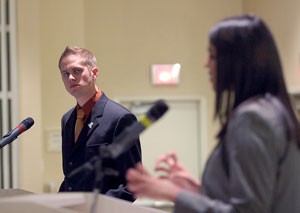Candidates for ASUA administrative vice president and executive vice president positions spoke about their platforms and the issues affecting students and clubs.
The debates were held in the Kiva Room in the Student Union Memorial Center, more than 25 students attended the debate.
James Pennington-McQueen and Seema Patel, both current Associated Students of the University of Arizona Senators and candidates for ASUA administrative vice president took the debate stage first to discuss their platforms.
Pennington-McQueen’s platform was centered around a new program that would implement ASUA Pulse, an outreach program aimed at better understanding what students want, which he said is an “”impetus for change using the student voice.””
Pennington-McQueen also wants to get a full-time staff director for the Women’s Resource Center.
“”We’re dealing with really important and big issues,”” Pennington-McQueen said.
Patel’s platform was aimed at diversity issues, and she said she hopes to make the Wildcat World Fair a weeklong event.
“”I want to represent the marginalized students on campus,”” Patel said.
Other points discussed were how to get money to clubs more efficiently, and getting freshmen involved with campus clubs and organizations.
“”There’s money out there. It’s just having the tenacity to go out there and get it,”” Pennington-McQueen said.
“”Outreach to students during orientation is vital. Its what’s going to help them on this campus,”” Patel said, who got her start as a member of freshman class council.
Patel said she hopes to get students interested by promoting the scope of what ASUA can do for the school.
“”I believe they don’t know what the student government can do for them,”” she said. “”The most important letter in ASUA is the ‘U.’ It’s about you.””
Incumbent Jessica Anderson and newcomer Chasen Moses went head-to-head in the debate for executive vice president, which advocates for the needs of clubs and serves as the president of the senate.
The executive vice president works with about 10 percent of a $1.1 million budget for clubs and organizations.
Moses, who has never previously been involved in the student government, said he hopes to reform club funding.
“”It’s too complicated and the clubs are suffering from it,”” Moses said. He said he also wants to raise the number of club advocates from five to ten next year.
Current Executive Vice President Anderson defended the current process of allocating club funding and she chose to lower the number of club advocates from seven to five this year to help create a stronger team.
“”Being from the inside it’s hard to see the problems,”” Moses said. “”Funding is the life and blood of these clubs.””
Anderson said she hopes to push funding initiatives and education so clubs have other resources for funding.
All four candidates were asked some lighter questions about who in history they would like to eat dinner with or what they would say to UA President Robert Shelton in an elevator, and some more difficult issues such as how they plan to fix the ASUA image in the wake of club funding controversies.
“”You really need to improve yourself before you can show yourself to the rest of the world,”” Pennington-McQueen said. “”You can’t take positivity and expect it to keep the ship together.””
The general election will be held March 11 and 12.









